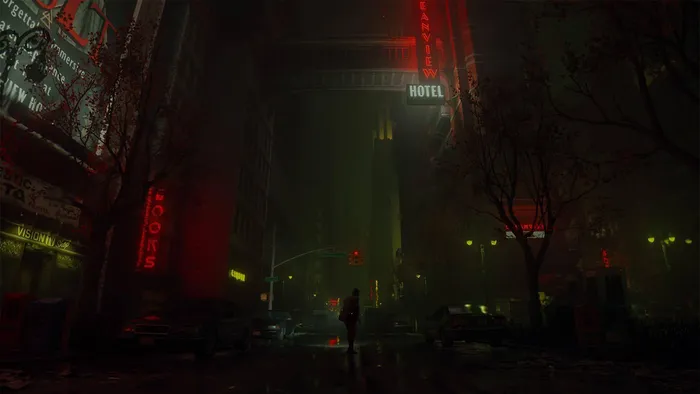
It’s December 19, 2023. I’m sat in a cafe writing this intro when I should be wolfing down mince pies because I’m technically on holiday. It’s been a hell of a year, though, and there simply weren’t enough days in December to finish this list before I clocked out. Still, it’s done. I managed to pick my five favorite titles of 2023.
Are they the Best Video Games of 2023? Maybe. Maybe not. But these are the titles that stuck with me for one reason or another. There were so many others that almost made this list—including Tears of the Kingdom, Puzzmo, Gubbins, Cocoon, and Moonring—but for the sake of my own sanity I had to draw the line somewhere. Have a read and consider diving into a few of these if you haven’t already. Or ignore me completely. Whatever takes your fancy. I’m outta here.
Alan Wake II (Remedy Entertainment)
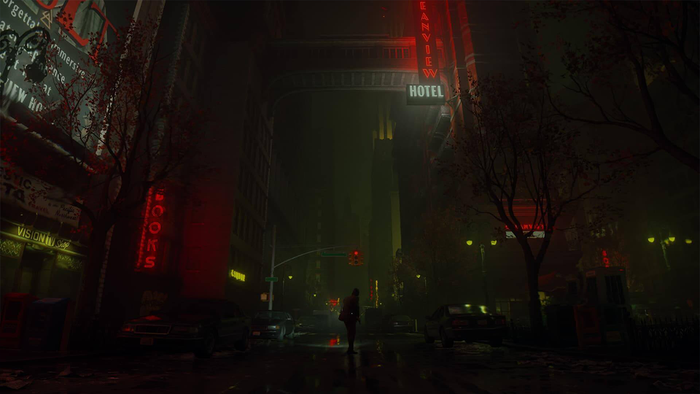
Image via Remedy
Alan Wake II is nothing short of a miracle. These days, it feels like the words “Return on Investment’ are more important than allowing studios to take bold creative risks, leading to the rise of live-service titles designed to endure for eons and a wave of conglomeration that has the likes of Embracer Group, Microsoft, and Sony trying to collect ‘IP’ like Infinity Stones.
Remedy’s answer to that trend was to spin off its own Remedy Connected Universe, laying the groundwork with Control before going full tilt with Alan Wake II. On a basic level, Alan Wake II is an accomplished entry in the survival horror genre that pulls from the palettes of Resident Evil, Silent Hill, and Twin Peaks. That, though, doesn’t even begin to scratch the surface.
Here we have a long-awaited sequel that deftly ties together and expands upon a burgeoning connected universe while balancing the intertwining narratives of two protagonists and layering in audacious, metaphysical story beats and live-action showstoppers that would sound unbelievable when laid out on paper. Not only does Alan Wake II expand on the promise of the original title, rewarding fans who’ve waited over a decade for the sequel, it feels like the culmination of everything Remedy has been working towards and the start of a new era of storytelling for a studio that isn’t afraid to get funky.
Baldur’s Gate 3 (Larian Studios)
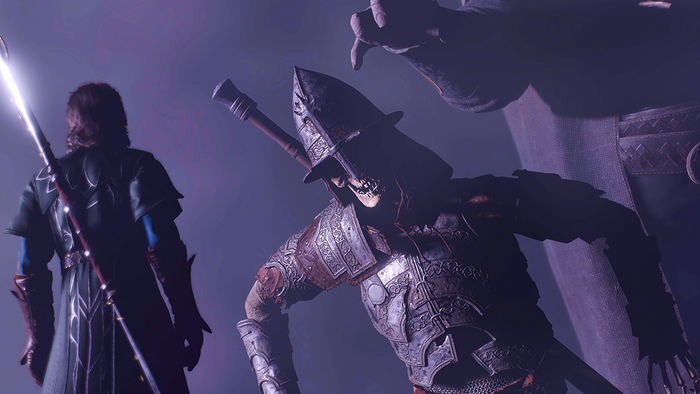
Image via Larian
Full disclosure: I’ve barely scratched the surface of Baldur’s Gate 3. I’ve only just started the game’s second act, but I’m already overawed at the accomplishments of developer Larian. That’s why it’s on this list. Not only has the studio made the formidable world of Dungeons & Dragons and the litany of mechanics that define the tabletop RPG accessible, it did so while creating one of the most compelling cast of characters in recent memory. This is evidenced by the fact that while I personally despise Gale and his unquenchable thirst for valuable magic artifacts, some members of the GD team love the dude. Their opinion, while clearly wrong, is a testament to the penmanship of the Baldur’s Gate 3 writing team.
I know I won’t be alone in saying this, but perhaps the biggest accomplishment of Baldur’s Gate 3 is how it bakes the mantra of ‘failure is success’ into every atom of the experience. Sure, we’re all guilty of save-scumming from time to time, but I can’t think of another title that actively rewards players for fucking up with such a delightful, devilish, and downright absurd lexicon of consequences. There’s something ludicrously thrilling about knowing you can turn victory into defeat (and vice versa) at almost any opportunity—especially when you come to realize Baldur’s Gate 3 has much bigger plans for your party than you could’ve ever envisioned.
Dredge (Black Salt Games)
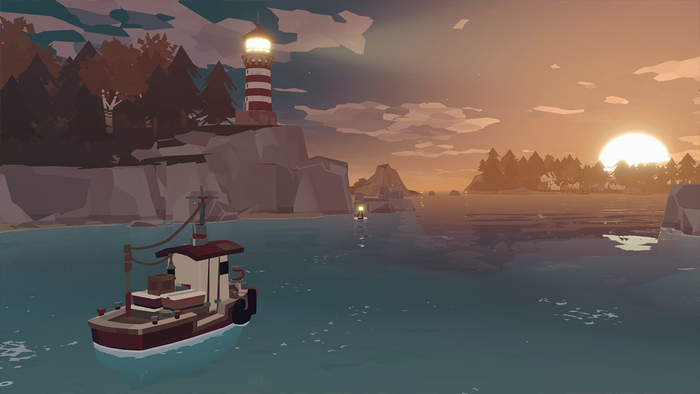
Image via Black Salt Games
Dredge is a near-perfect debut from New Zealand studio Black Salt Games. The eldritch fishing adventure is a beautiful example of cohesive, compact game design that excels by prioritizing quality over quantity. The title leans into the horror of the ‘unseen’ by leveraging a time-based movement mechanic (the day/night cycle only progresses when you move in-game) to weaponize players’ worst fears—making them carefully consider what terrors might befall them should they become trapped in the yearning open ocean when sunlight fades.
It’s a tactic that imbues staple acts—such as questing, fishing, and exploring—with a palpable sense of dread. Couple that masterful approach to psychological horror with evocative visuals, a narrative that fully commits to the premise, and sharp puzzling mechanics in the form of Tetris-inspired storage management and finishing mini-games that actually feel compelling–and, well, you’ve got all the hallmarks of a classic.
Humanity (Enhance / Tha Ltd)
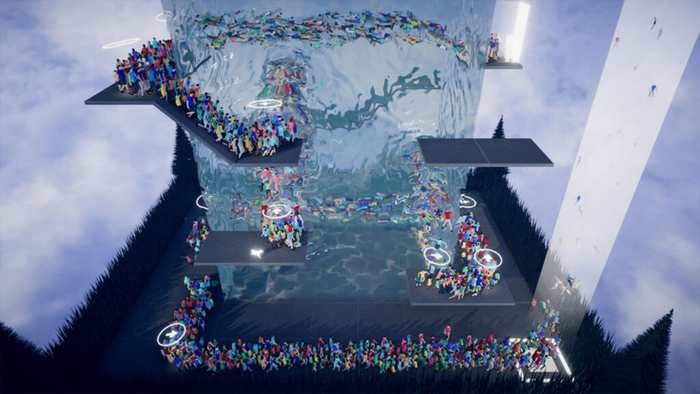
Image via Enhance
Each time I’m asked to describe Humanity I splutter and stutter like an absolute fool. This is an experience that is all about feeling and that’s tough to capture on paper. I understand that might be hard to believe given Humanity is outwardly a Lemmings-like puzzler about ferrying gaggles of misplaced humans through something resembling a digital afterlife as an omniscient Shiba Inu—but trust me, this game was designed to tickle the senses. And boy does it succeed.
Anyone familiar with the past work of co-developer Enhance, known for creating synesthetic titles like Tetris Effect, Rez Infinite, and Lumines, will know precisely what I mean. Humanity is everything. It wants you to forget. About your worries. Your corporeal world. Space and time. It all becomes meaningless. There is only the beat. The ethereal self. The new you. A radiant canine unbound by convention. Bork loud and bork proud, friend. Save us all.
Jusant (Don’t Nod)
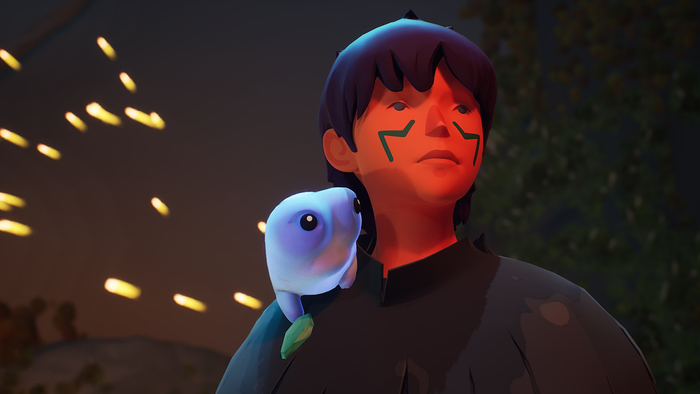
Image via Don’t Nod
Jusant is a gorgeous rhythmic puzzler disguised as a climbing game. There’s a real cadence to traversal in Dont Nod’s vertical adventure, which expands on the familiar (and excellent) climbing mechanics featured in Tears of the Kingdom by adding more complexity in the form of pitons that can be knocked into walls to provide safe-holds during major ascents and a rope that needs to be managed whether you’re clinging to the cliff face or preparing to make a daring leap of faith. Each searching hand and dangling foot is also mapped to a bumper on the gamepad, tethering players to the environment in a way that feels unerringly tactile.
The soul of the game, however, is a wordless narrative that does so much with so little. As players inch upward in search of an elusive summit, they’ll learn more about the arid world around them by peeking into past lives. Abandoned letters scrawled by former residents; the journals of other climbers who also set out in search of hope; and mystical ruins that can only be unlocked with help from your mystical companion. In some ways, it feels like Jusant propels players towards its climax just as its hitting its stride, but there’s something to be said for choosing to end on a soaring high.
On a personal level, I found a new appreciation for intimate stories that don’t outstay their welcome in a year where massive titles like Tears of the Kingdom, Baldur’s Gate 3, and Starfield (many of which I adore, but have yet to finish) stole headlines. Jusant is fleeting, yes, but perhaps all the more special for it.






